The teaching work in technological scenarios. Transformations and reflections
DOI:
https://doi.org/10.60020/1853-6530.v11.n21.29434Keywords:
teachers; workers; new technologies; open learning systemAbstract
From the assumption that technology-mediated education requires interdisciplinary work, the article shares reflections arising from dialogues with workers in distance education at higher-level institutions in Córdoba (Argentina) that account for the legal helplessness in which they carry out their tasks, since despite the requirements of the collaborative task, the high professionalism of the teams and complex skills involved, their recognition is limited. The text problematizes the situation of agents framed in undefined work categories, in which the scope of the work is not clearly stated. a work that in practice then far exceeds the contractual clauses, and proposes dimensions of analysis and pending debates in order to collaborate in the construction of an agenda discussion agenda that systematizes the worker's actions in distance education, placing it within a framework fair legal and protection of their rights.
Downloads
References
CASTELLS, M. (1997). La Era de la Información. Economía, Sociedad y Cultura. Buenos Aires: Siglo XXI editores.
DELORS, J. (1996). “Los cuatro pilares de la educación”. En La educación encierra un tesoro. Informe a la UNESCO de la Comisión internacional sobre la educación para el siglo XXI. Madrid, España: Santillana/UNESCO. (pp. 91-103).
GONZÁLEZ, H. (2016). “Educación a distancia y el debate académico en las universidades de Argentina”. Recuperado de: www.unicen.edu.ar/content/educación-distancia-y-el-debate-académico-en-las-universidades-de-argentina
MAFFESOLI, M. (2004). El nomadismo. Vagabundeos iniciáticos. México: F.C.E
MARCELO, C. (2001). Aprender a Enseñar para la Sociedad del Conocimiento. Revista Complutense de Educación, 12(2). Recuperado de: http://revistas.ucm.es/index.php/RCED/article/viewFile/RCED0101220531A/16749Revista
MARTÍNEZ, M. T. (2008). La educación a distancia. Tesis de Maestría en Procesos educativos mediados por nuevas tecnologías. Centro de Estudios Avanzados. Universidad Nacional de Córdoba. Argentina.
UNIVERSIDAD NACIONAL DE CUYO (2017). Nueva propuesta de Sistema Institucional de Educación a Distancia de la UNCuyo. Secretaría Académica. Recuperado de: http://www.uncuyo.edu.ar/academica/nueva-propuesta-de-sistema-institucional-de-educacion-a-distancia-de-la-uncuyon
UNIVERSIA ESPAÑA (2013). Los derechos de los trabajadores a distancia. Universia España. Recuperado de: http://noticias.universia.es/empleo/noticia/2013/03/06/1008924/derechos-trabajadores-distancia.html
VARGAS, O. (2017) Trabajar en cualquier momento y en cualquier lugar: consecuencias en el ámbito laboral» (Working anytime, anywhere:The effects on the world of work). Recuperado de www.eurofound.europa.eu/publications.
Published
How to Cite
Issue
Section
License
Copyright (c) 2020 Virtuality, Education and Science

This work is licensed under a Creative Commons Attribution-NonCommercial 4.0 International License.
The generation of derivative works is allowed as long as it is not done for commercial purposes. The original work may not be used for commercial purposes.


